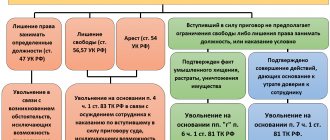Enforcement proceedings are the final stage of collection of overdue loans and other obligations. The creditor receives a court decision and goes with it to the territorial branch of the FSSP Federal Bailiff Service to receive the money legally due.
Next, enforcement proceedings are initiated, on the basis of which the bailiff recovers the amount of cash proceeds in favor of the creditor. But sometimes debtors receive a notification (for example, SMS from Sberbank) that collection under enforcement proceedings has been terminated. What does it mean? Let's figure it out.
Legal grounds for termination of enforcement proceedings
So why do bailiffs stop enforcement proceedings altogether? On this score, the law takes an unambiguous position: Art. 43 No. 229-FZ “On Enforcement Proceedings” lists specific grounds.
The court stops penalties
for enforcement proceedings, if:
- the creditor died or was declared missing;
This is realistic provided that the claimant's right does not pass to heirs or other persons.
- collection is impossible for a number of reasons;
- the creditor refused to receive things that belonged to the debtor and which must be transferred to the claimant by court decision.
Material on the topic
Find out debts from bailiffs by last name
It’s better to talk about debts handed over to bailiffs for collection...
Reasons for termination of enforcement proceedings by bailiffs
are also strictly defined by law. The bailiff declares the end of collection in the following cases:
- the creditor refused to collect;
- the court decided to terminate execution of the document;
- the court approved the settlement agreement regarding the interested parties;
- the judicial act was canceled;
- the executive document was declared invalid or cancelled;
- the company that acted as the collector was excluded from the Unified State Register of Legal Entities;
- alimony obligations have ceased, as provided for in Art. 120 IC RF;
For example, if a child has reached legal age, he is adopted; if one of the parties died: the child support parent or the child.
- the debt was recognized as bad (this is only possible in relation to budget debts);
- the individual has ceased to have obligations to the creditor who holds his collateral. Accordingly, collection by card and other means has been stopped, and the measures are no longer applied.
The listed grounds mean that in case of cancellation all obligations are terminated. That is, it is no longer possible to resume such production.
For example, if the debt is recognized as uncollectible or if the creditor dies and his right to claim is not inherited. As a rule, such a picture arises with debt obligations of a personal nature - the same as alimony or compensation for causing moral harm.
Article 43. Termination of enforcement proceedings
- Enforcement proceedings are terminated by the bailiff in the following cases:
- adoption by the court of an act to terminate the execution of the writ of execution issued by it;
- the court's acceptance of the claimant's refusal to foreclose;
- court approval of a settlement agreement, a reconciliation agreement between the claimant and the debtor;
- cancellation of the judicial act on the basis of which the executive document was issued;
- cancellation or invalidation of the executive document on the basis of which enforcement proceedings were initiated;
- termination, on the grounds and in the manner established by federal law, of the execution of a judicial act, an act of another body or official in a case of an administrative offense by the court, other body or official that issued the executive document;
- making an entry on the exclusion of a legal entity (collector-organization or debtor-organization) from the unified state register of legal entities;
- if the executive document contains a requirement for the return of a child illegally transferred to the Russian Federation or held in the Russian Federation or for the exercise of access rights in relation to such a child on the basis of an international treaty of the Russian Federation and the child has reached the age after which the specified international treaty is not subject to application in relation to this child;
- termination of alimony obligations on the grounds provided for in paragraph two of paragraph 2 of Article 120 of the Family Code of the Russian Federation;
- hopeless for collection of debt on payments to the budget in the manner established by the legislation of the Russian Federation;
- if the executive document contains a requirement for the collection of state duty in a case considered by the court on the collection of debts on payments to the budget, in respect of which, in the manner established by the legislation of the Russian Federation, a decision was made to recognize it as hopeless for collection;
- termination of the obligations of the borrower - an individual to the creditor-mortgagee in accordance with paragraph 5 of Article 61 of the Federal Law of July 16, 1998 N 102-FZ “On Mortgage (Pledge of Real Estate)”.
Federal Law of October 2, 2007 N 229-FZ (as amended on December 22, 2020) “On Enforcement Proceedings”
Read completely
Source
How to cancel proceedings in bankruptcy? Enforcement proceedings are suspended in case of bankruptcy.
If the court introduces a procedure for the sale of property against the debtor, the bailiff is obliged to take action. If, upon completion of bankruptcy, a person’s debt obligations are removed, then the proceedings are closed permanently.
Initiation of enforcement proceedings
The initiation of enforcement proceedings by a bailiff (hereinafter referred to as the bailiff) on the basis of a writ of execution is regulated in detail by Articles 30, 33 of Federal Law No. 229-FZ “On Enforcement Proceedings” (hereinafter referred to as Federal Law No. 229-FZ), which are very important to know not only the collector, but also the debtor in enforcement proceedings (hereinafter referred to as the individual entrepreneur).
Based on the provisions of Articles 30, 24 of Federal Law No. 229-FZ, the bailiff is obliged to send a copy of the resolution to initiate an individual entrepreneur no later than the day following the day of the said resolution to the debtor by registered mail with acknowledgment of delivery.
Part 1 of Article 24 of the Federal Law No. 229-FZ lists many ways of notifying about the initiation of an individual entrepreneur, but when considering an administrative claim of a debtor when appealing the actions (inactions) of a bailiff, important evidence is the bailiff sending a copy of the resolution to initiate an individual entrepreneur by mail in a valuable letter with notification of delivery. More details about this with examples from judicial practice can be found here
What depends on whether the debtor learned about the initiation of an individual entrepreneur against him by the bailiff in a timely manner, not in a timely manner, or did not know at all?
Firstly
, the debtor’s ability to voluntarily pay in full or in part the debt specified in the writ of execution within 5 days from the date of receipt of the resolution to initiate an individual entrepreneur depends on this. And the amount of the enforcement fee depends on this, which the bailiff can collect from the debtor on the basis of Article 12 of Federal Law No. 229-FZ (the amount of the enforcement fee is 7% of the debt amount). How a debtor can avoid collecting the enforcement fee or reduce it, see here
Secondly
, the ability of the debtor to timely cancel the court order issued by the magistrate depends on this. How a debtor can do this correctly, see here
Third
, the possibility for the debtor to timely suspend enforcement proceedings by filing an application with the court for granting an installment plan for the execution of a court decision on the basis of Article 203 of the Code of Civil Procedure of the Russian Federation also depends on this. How to do this, see here
Fourth
, the possibility for the debtor to recognize as illegal the bailiff’s decision on a temporary restriction on the debtor’s departure from the Russian Federation on the basis of Article 67 of Federal Law No. 229-FZ depends on this. How a debtor can do this, read more here
Fifthly
, this may depend on the court’s cancellation, on the basis of an administrative claim by the debtor, of a bailiff’s order to seize the debtor’s property, if the debtor did not know about the bailiff’s initiation of an IP against him. For some ways to protect a debtor when his property is seized by a bailiff, see here
In what cases is the writ of execution returned to the creditor?
Let us remind you that the return of writs of execution means that collection is no longer carried out. How to close enforcement proceedings? The bailiff can return the document if the debt has not yet been collected. At least not completely.
This happens in cases provided for in Art. 46 No. 229-FZ:
- If the corresponding application was filed by the creditor - for example, when the parties agreed and decided to terminate the official collection procedure. In such a situation, the claimant needs to submit an application to the FSSP and withdraw the enforcement proceedings.
- When it is impossible to carry out collection under a writ of execution. A typical case is when the debtor has neither money nor property.
- The bailiff was unable to find the debtor, his property or obtain relevant information.
- The creditor did not want to take the debtor's property to pay off the debt.
- The claimant began to obstruct the execution of the proceedings.
In these cases, the creditor retains the right to initiate enforcement proceedings again after some time.
- The standard period is 6 months
. Six months after the document is returned, the claimant must again go to the FSSP and write a statement on the basis of which enforcement proceedings will be resumed. - You can start proceedings earlier than six months
- but provided that the debtor has improved his material or financial situation. For example, he acquired expensive property, received an inheritance, or got a high-paying job. In such a situation, the creditor must contact the FSSP to resume collection.
Actions of the debtor during enforcement proceedings
The debtor, when initiating enforcement proceedings, can act in various ways:
- Pay off the debt in full.
If this is implemented within five days from the date of initiation of proceedings, the enforcement fee will not be collected. This will save on costs.
- Pay the debt in installments.
Here it is important to agree with the bailiff and the bank on the frequency of payments, however, depositing funds does not guarantee that coercive methods will not be applied in parallel.
- Don't pay the debt.
This will lead to the fact that funds will be obtained through the use of methods of forced collection, including inventory and sale of property.
It is strongly recommended not to deliberately avoid paying a debt, as this may lead to administrative and criminal liability, as well as additional costs.
What are the consequences following the termination of enforcement proceedings?
What does “card collection stopped” mean? The consequences of termination of collection are prescribed in Art. 44 No. 229-FZ. First of all, the bailiff draws up a resolution that cancels previously taken penalties.
These include cancellations:
- monthly write-off of the debtor's income in the amount of 50%;
- seizure of property;
- ban on crossing the territory of the Russian Federation;
- driving ban.
This also includes the return of property that was previously seized from the debtor.
That is, all measures taken are subject to immediate cancellation if valid reasons for termination arise.
A little about FSSP statistics
As of April 1, 2021, statistics show that there are about 19 million debtors in Russia, of which 7 million have partially lost freedom of movement - in enforcement proceedings, bailiffs forbade them to leave the Russian Federation. Let us remind you that the FSSP has such an opportunity when a person owes 30 thousand rubles or more.
If we compare these figures with data for 2021, the number of debtors in the country has increased - a year ago there were 16.8 million, of which only 4 million people could not even go on vacation to Turkey, which is not at all exotic for most Russians.
Material on the topic
Is it possible to negotiate with the bailiffs on an installment plan based on a writ of execution?
According to FSSP statistics, this year bailiffs banned...
At the same time, NAPKA, the National Association of Professional Collection Agencies, commented that on average the amount of debt of Russians who are not allowed to travel abroad is 85 thousand rubles per person. Mostly we are talking about overdue consumer loans. Up to 95% of debtors have both bank loans and overdue microloans at the same time.
Why do people not pay their debt obligations and end up going to the extreme, that is, to enforcement proceedings? Why do they allow money to be forcibly deducted from them?
Alas, the reasons are simple and banal:
- Job loss.
Against the backdrop of the pandemic, many previously stable enterprises were forced to reduce staff and production volumes. As a result, ordinary workers with loans lost their jobs and found themselves without a livelihood. - Decrease in income.
Against the backdrop of rising prices and foreign currency, wages are stagnant at best. But they are often cut back as enterprises and businesses try to survive in difficult times.
The Association of Collectors comments that for such people, the restriction on traveling abroad does not have much impact. Debtors have no money, they are stressed and wondering how to survive. They have no time for travel. The Union of Housing Organizations also commented on the situation from their side: many people have recently begun to grow debts on housing and communal services.
Innovations in the work of bailiffs
It happens that the FSSP is not able to correctly identify debtors. Often enforcement proceedings are opened against people who have not taken on debt obligations at all. The problem is that identification occurs according to the following parameters:
- Date of Birth;
- Place of Birth;
- Full name of the debtor.
As a result, bailiffs contact various government agencies in order to correctly identify a person: Rosreestr, Federal Tax Service and other government agencies. Clarification of these circumstances entails delaying the procedure.
At the moment, a draft with new requirements has been submitted to the State Duma, which should help improve the efficiency of compulsory collections. In particular, it is proposed to use the following criteria:
- TIN;
- SNILS;
- information about driver's licenses and vehicle registration certificates;
- passport details.
This will improve the efficiency of the FSSP, helping to reduce such errors. There are often situations when bailiffs describe things and seize the property of people who are not involved in the debt at all - those who were simply confused with someone else.
Do you need advice regarding enforcement proceedings and their termination? Contact us. Our lawyers will tell you in detail about this procedure and help you in your situation.
Let us help you write off your debts
Our lawyer will call you in a few minutes and answer all your questions
FAQ
- Is it possible to temporarily stop collection under enforcement proceedings?
Yes. To do this, you need to draw up an application and go to court with a request for an installment plan. It will allow you to temporarily not pay anything - any write-offs will be cancelled. In court, it is necessary to refer to compelling reasons for the delay: for example, loss of income, illness, dependents (children, elderly parents, etc.). - Will several enforcement proceedings on credit debts be closed for the debtor at once if he applies for bankruptcy recognition?
Yes, the bankruptcy procedure implies that from the first court hearing the claims against the debtors are terminated. Enforcement proceedings are also suspended. At the end of the procedure, they will be closed completely - unless we are talking about debts that cannot be written off (compensation for harm and alimony).
- Is it correct that for extrajudicial bankruptcy it is necessary to first close the enforcement proceedings initiated by the bailiffs?
Yes, that's absolutely right. First, you must have closed proceedings due to lack of property and income, and then you can contact the MFC for a free debt write-off procedure.
- How to stop a collection that has already been started by the bailiff?
Unfortunately, it is impossible to stop the legal demands of the claimant. You can try to challenge the claims in court by appealing to a higher authority. In this case, the actions of the bailiff will be temporarily suspended, and then everything depends on the court’s decision.
Enforcement proceedings by court order
Since the court order, in itself, is an executive document, having it, you can go to the bailiff service to file an application to initiate enforcement proceedings.
But before you carry out your plans, you need to make sure that the court order has the force of an executive document.
It is important to know! Being an executive document and having the force of an executive document are two different things.
Let's figure out what's the catch here.
The main problem when initiating enforcement proceedings based on a court order is the lack of a date for its entry into force. As a rule, the order itself does not contain such a date, since the judge does not set it.
The fact is that it is unknown until the debtor is properly notified of the existence of such a decision. And since all notifications are sent by mail, it is unknown when this event will happen.
In addition, it may not happen at all if the debtor is on a long business trip or is in the hospital. In other words, he does not live at his registered address.
What to do in such a situation? To get the answer, read the article further.
Video on the topic
Debt collectionDebtsBailiffs
Author:
Vladislav Kvitchenko
Expert in the field of bankruptcy of individuals. He has been an active arbitration manager since 2015. Konstantin’s publications are published in various expert publications and media. Active participant in conferences, seminars and discussions on amendments to the current legislation of the Russian Federation on bankruptcy.





